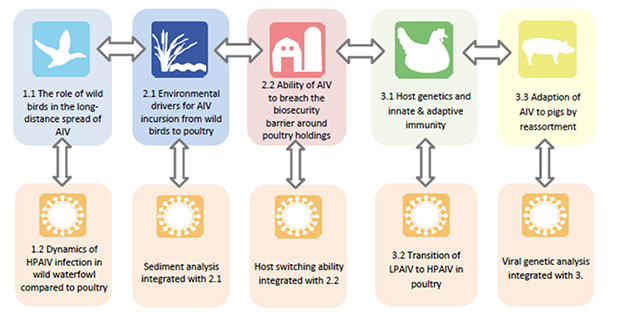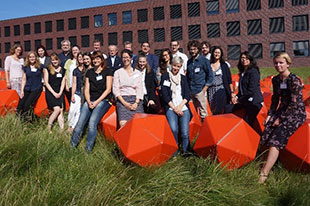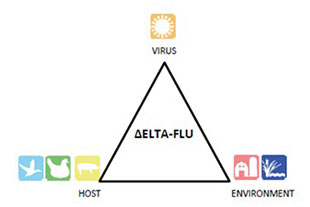Sharon Brookes, Head of Avian Virology and Mammalian Influenza at APHA, talks about our involvement in the new DELTA-FLU project funded by the EU.
The DELTA-FLU project started on 1 June 2017 and is funded by the EU until 2022. The Friedrich-Loeffler-Institute (FLI) and the ERASMUS University Medical Center (EMC, Rotterdam) are co-coordinators. The project includes other partners from Italy, Belgium, Scotland, Sweden and Hong Kong, USA and Canada.
The main objective of the collaboration is to determine the potential for certain highly pathogenic avian influenza viruses (HPAIV) to be maintained in wild waterfowl populations and to spread long-distance along interconnected migratory flyways.
This project will also try to identify key viral, host-related and environmental factors and the roles that these factors play in the dynamics of avian influenza in poultry and other host species.
Background
Avian influenza, more commonly known as bird flu, is an infectious disease caused by viruses whose natural reservoir hosts are wild water birds. The virus naturally undergoes constant and rapid change and can cause devastating worldwide outbreaks in wild birds and domestic poultry within a short space of time.
Some of these pathogens have the potential to be transmitted to mammals and humans (zoonotic) representing a threat for human health such as the ongoing epidemic of H7N9 in China.
The latest avian influenza epidemics caused by H5N8 HPAIV since 2014, is so far the most severe outbreak in Europe. Research into influenza viruses requires global interdisciplinary solutions, the DELTA-FLU consortium is composed of experts from Europe, North America and Asia.

The project

The project and its partners will conduct research on the dynamic mechanisms of avian influenza viruses in poultry and other hosts, as well as on the viral, host-related and environmental factors which are crucial for the replication and spread of these pathogens.
A better understanding of these mechanisms and factors is essential for the design of effective strategies for diagnostics, prevention and control.
Studies will provide insights into the pathogenicity, i.e. the induction, development and severity of disease in different host animal species.
Furthermore, the project intends to conduct investigations on the stability of viruses in the environment and on their activation by host-encoded proteins (enzymes) as well as on the immune reaction of the respective host and the evasive manoeuvers of the viruses.
DELTA-FLU will also conduct research on key issues, such as, how HPAIVs are maintained in the wild bird population and can be spread over long distances and which factors are relevant for introduction of avian influenza viruses into domestic poultry holdings and the role that pigs play in the possible transmission to humans.
DELTA –FLU key aims

One crucial aim of the project will be to explain the mechanisms which turn harmless influenza viruses into dangerous AIVs capable of causing notifiable avian disease, with wide reaching economic and trade restrictions.
DELTA-FLU is formed of a global consortium with expertise in the field of avian influenza encompassing virology, molecular biology, epidemiology, pathology, ecology, ornithology and disease policy.
Partners include the EU International Reference Laboratory for Avian Influenza, 4 Reference Laboratories of the Food and Agriculture Organization the United Nations (FAO) and the World Organisation for Animal Health (OIE) and one OIE Reference Laboratory for Swine Influenza.
If you would like more information about the DELTA-FLU project, please contact Sharon Brookes.
Follow APHA on Twitter and don't forget to sign up to email alerts.

Recent Comments